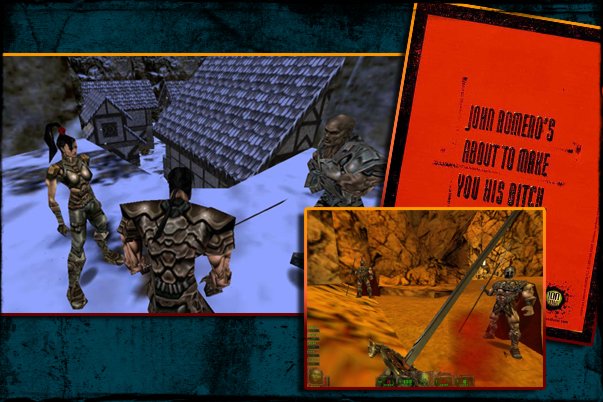The Top 7... PR disasters
We chronicle the embarrassments that the industry would rather you forgot
3. Daikatana
Will John Romero make you his bitch? Can he? The early magazine ads for Daikatana certainly seemed to think so, loudly touting the Doom co-creator's bitch-making prowess in bold, black letters. Now, if his game-making prowess had been as legendary, Daikatana might not be on this list.
Almost four yearsand millions of dollars in the making, Daikatana was the game industry's first truly great runaway production. The wildly ambitious flagship project of Ion Storm, a company founded by the then-celebrated Romero under the credo "Design is Law," the game was supposed to usher in a new era of creative freedom and break down any restrictions on designers' visions. Instead, it was a fiasco of epic proportions, due largely to a premature PR blitz (including coverage in TIME magazine and the aforementioned "bitch" ad) that laid the foundation for Daikatana becoming an object of widespread ridicule.
3. Daikatana
Will John Romero make you his bitch? Can he? The early magazine ads for Daikatana certainly seemed to think so, loudly touting the Doom co-creator's bitch-making prowess in bold, black letters. Now, if his game-making prowess had been as legendary, Daikatana might not be on this list.
Almost four yearsand millions of dollars in the making, Daikatana was the game industry's first truly great runaway production. The wildly ambitious flagship project of Ion Storm, a company founded by the then-celebrated Romero under the credo "Design is Law," the game was supposed to usher in a new era of creative freedom and break down any restrictions on designers' visions. Instead, it was a fiasco of epic proportions, due largely to a premature PR blitz (including coverage in TIME magazine and the aforementioned "bitch" ad) that laid the foundation for Daikatana becoming an object of widespread ridicule.

Work on Daikatana began in 1997, and was supposed to have been finished in seven months. As production snowballed, the game was nearly completed, then scrapped and rewritten from scratch. Rivalries and feuds developed within the company, and reports started emerging from disgruntled employees that the development team was unfocused and unable to work together. And whether it was deserved or not, Romero's image became one of an aloof millionaire who partied while his pet project crumbled around him.
Weekly digests, tales from the communities you love, and more
By the time Daikatana finally hit stores - in 2000, after numerous well-publicized delays - gamers who'd been fed a steady diet of negative Ion Storm gossip were all too eager to hate it. Not that they really needed prepping; once the game saw the light of day, it became clear that John Romero was maybe - maybe - capable of making you a sandwich and calling it "his bitch." (That would also conveniently explain the ad's "Suck it Down" tagline.) Daikatana was an ugly mess of dated graphics, awkward gameplay and wildly uninteresting enemies. Worse, the game's biggest "innovation" - sidekicks whom you needed to protect - turned out to be its biggest liability, as their computer-controlled brains would diligently do whatever it took to get them killed.
Daikatana could have been just another mediocre shooter that passed silently into obscurity, leaving no imprint except a valuable lesson for Ion Storm's developers and a vague bad taste in the mouths of gamers. Unfortunately, Romero and his big mouth had to go and hype the shit out of it, and as a result Daikatana is blamed not only for sinking Ion Storm, but also for sending Romero's career plummeting from stardom to relative obscurity.
Work on Daikatana began in 1997, and was supposed to have been finished in seven months. As production snowballed, the game was nearly completed, then scrapped and rewritten from scratch. Rivalries and feuds developed within the company, and reports started emerging from disgruntled employees that the development team was unfocused and unable to work together. And whether it was deserved or not, Romero's image became one of an aloof millionaire who partied while his pet project crumbled around him.
By the time Daikatana finally hit stores - in 2000, after numerous well-publicized delays - gamers who'd been fed a steady diet of negative Ion Storm gossip were all too eager to hate it. Not that they really needed prepping; once the game saw the light of day, it became clear that John Romero was maybe - maybe - capable of making you a sandwich and calling it "his bitch." (That would also conveniently explain the ad's "Suck it Down" tagline.) Daikatana was an ugly mess of dated graphics, awkward gameplay and wildly uninteresting enemies. Worse, the game's biggest "innovation" - sidekicks whom you needed to protect - turned out to be its biggest liability, as their computer-controlled brains would diligently do whatever it took to get them killed.
Daikatana could have been just another mediocre shooter that passed silently into obscurity, leaving no imprint except a valuable lesson for Ion Storm's developers and a vague bad taste in the mouths of gamers. Unfortunately, Romero and his big mouth had to go and hype the shit out of it, and as a result Daikatana is blamed not only for sinking Ion Storm, but also for sending Romero's career plummeting from stardom to relative obscurity.



